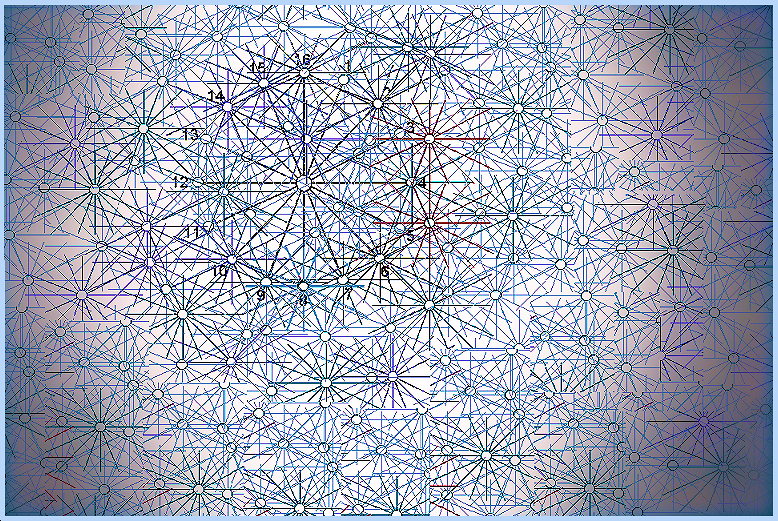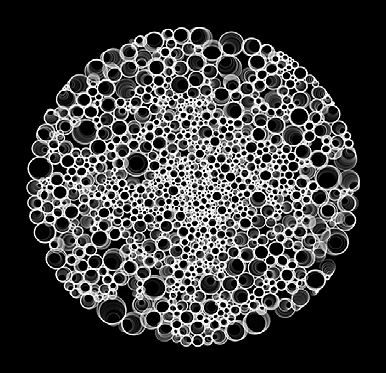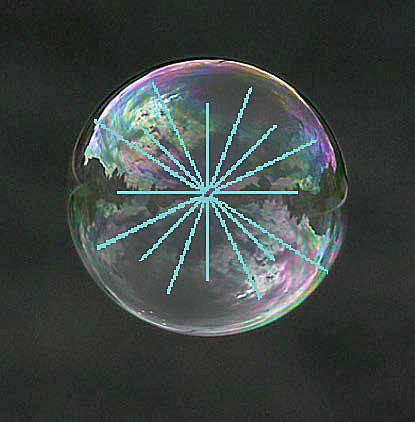Home › Forums › Visual Arts › ‘Imagining’ Time and Appearance
Tagged: imagination, inquiry, time
- This topic has 3 replies, 1 voice, and was last updated 07/23/2022 at 1:24 PM by David Filippone.
-
AuthorPosts
-
-
October 6, 2021 at 7:55 pm #782

[Photo: Confluence of a Continuum of 16’s, by David Filippone]
In the book, ‘Sacred Dimensions of Time and Space,’ Rinpoche employs a kind of metaphor for a geometry of space, to illustrate how the unformulated assumes form. Where this might happen is at the edge of the future, where the future could be said to come into being… During the first micro-seconds of perception, before a ‘self’ has taken a subjective position as ‘I’ separate from the object it is perceiving. Perhaps during this micro-flash instant of ‘first impressions’ that human sensing apparatus encompasses – there is a whole, at the beginning of the ‘readout’. After which, in milli-second flashes mind does its ‘cognize, identify, and re-cognize’ sequence on its way to making experience meaningful through labels, interpretations, and stories. So at the very beginning of perceptions where zero begins formulating to 16… energetic non-things might begin to cohere and arise from an unknown future…
‘Imagining’ Time and appearance with TSK… Rinpoche ‘perpends’, saying in ‘Sacred Dimensions of Time and Space’…
“Between simultaneous and linear a contradiction operates. Perhaps this is a clue that our point of view does not yet have a wide enough angle. What if all times were connected together? What if time could move in all directions? Where might we discover the inner dynamics, the interconnections, and the transmission points in time? Suppose there is another time inside the time we know, a fourth dimension of time. If we could enter that time, would the mechanisms of time’s magical abilities be differently illuminated?
Mechanism of Precision
Imagine that each point in time requires 16 transition points to reach completion. If the stages are not clear and distinct, precise connections could likely not be made. Without specificity, the event or object would not take form or else would not take form completely. Its development or manifestation would be stalled.
If time’s dimensions did not reach the 16th degree, time’s power would likewise remain diffuse, its momentum not focused and directed. Time would be unable to inspire, but could only push or drag. Depending on all the interconnections, it might move slowly or rapidly, smoothly or erratically, but it would not bring forth a clear form.
In contrast, once the full complement of the 16th degree has been reached, a transition can be made. If we see in terms of sequences, we might suppose another set of 16 begins to develop, a new series of possibilities not possible before the transition. If we do not see in terms of sequences, we might imagine 16s everywhere, all the time.
Dynamic of Boundlessness
Let us call ‘zero’ being, or let us call it space, time, and knowledge. Zero is the starting point: any point of space, time, and knowledge. If zero expands to 16, every 16 is zero and every zero is 16. Accordingly, 16 implies specificity, but also boundlessness, the perfectly fulfilled four times four, wide open in every direction. As an image for this open fulfillment, imagine a sphere with a mirrored surface cut into millions of facets, reflecting light in all directions simultaneously…16 allows for transition. 16 is a gateway through which space and time appear. But the transition of 16 may or may not appear. Zero may re-main zero, or may manifest as particles and qualities…” p126-7 [Emphasis added]
- This topic was modified 4 years, 4 months ago by David Filippone.
-
October 7, 2021 at 4:37 pm #783

Photo: Circle of Circles
“If we focus on the shape of zero, we find a line in the shape of a circle, a curving edge that connects only to itself. Inside the line is space, and outside the line is space: the edge is the edge between space and space, and so it is not an edge at all. This ‘edge that is no edge’ is the fitting symbol of space. From that perspective, every line that defines and gives shape is a symbol—space within, space without: an edge without substance. Every line, every shape returns to zero as the symbol of space. Every beginning, every ending, even every existent!”
…..’Sacred Dimensions of Time and Space, Tarthang Tulku, p. 50- This reply was modified 4 years, 3 months ago by David Filippone.
-
October 7, 2021 at 4:38 pm #784

Photo: Zero at beginning of 16, Three-Dimensional Immagining
“We have seen that zero gives rise to 16. If zero is the point before it manifests as point, 16 identifies the precise, exacting means through which zero, having given location, makes possible the move from ‘nothing’ to structure and form. 16 is the transition of zero, the foundation for the architecture of manifestation.”
…..’Sacred Dimensions of Time and Space,’ Tarthang Tulku, p. 36- This reply was modified 4 years, 3 months ago by David Filippone.
-
July 23, 2022 at 1:24 pm #979

Photo: ‘Zeros’ – Pixabay
Here is a cross-link to a series of posts on this Forum in which I quoted Rinpoche, and also from the book ‘Unformulated Experience,’ by Donnel B. Stern. I mentioned in a recent TSK Study Group, as we tried to get our heads around the ‘gap’ between thoughts, that it’s really only a gap/blank, [or openness], depending on the perspective we have adopted. The zero-point of 16 is central. I promised the group I would share some quotes from the books… Not suggesting I have answers or am proclaiming anything in these posts. Think of them as practice notes on my journey of inquiry…
https://discussions.creativeinquiry.org/forums/topic/unformulated-experience/
-
-
AuthorPosts
- You must be logged in to reply to this topic.
